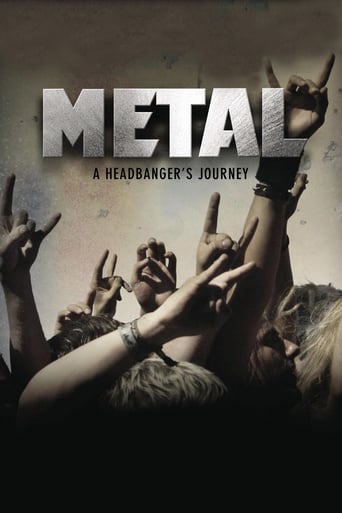

I wanted to watch this documentary because out of the blue one day I became immensely curious as to how many people actually listen to death metal and black metal and also why they chose to do so. I tend not to like the more extreme metal bands, though unlike many people, who have very strong reactions either way, I've always been the unusual case of a fence-sitter, not opposed to it in anyway but not in love with it either. For instance I really don't mind Iron Maiden, Black Sabbath, and even It Dies Today, All That Remains, and Mastodon and was even leaning in a metalhead direction in my younger days, but I guess I just never "got" the whole death growl, satanic, gory imagery "thing." But the question I was after, and which I think this film answers, is what draws people to the most extreme and controversial representatives of the genre, like Scandinavian black metal and bands like Cannibal Corpse. On the one hand it confirmed my suspicion that much of the scene (like Slipknot and Gwar) is tongue in cheek and not overly serious; just pageantry, entertainment, and playful provocation of the mainstream. Many of these bands seem to nurture a culture of envelope-pushing, and the market just encourages this, rewarding those that shock and awe just as much as it does in other industries. But the film also reveals a deeper truth that was really at the heart of it, and that is the sense of power, freedom, escape, and belonging that the music offers and which "outsiders" feel especially drawn towards. Its not so much the music or the lyrics that appeal as much as it is the big "f**k you" that it all represents and which empowers the listener with that shared feeling of resistance. In short this film provided an excellent and accessible analysis of the genre, with deep insights into the psychology, sociology, and anthropology of its practitioners and followers. And of course the perfect person to do it is our narrator, an avid metalhead and anthropologist, whose obvious enthusiasm for every interview and festival he goes to almost makes you wish you were a die-hard metalhead too.
... View MoreI have to warn people to take everything here with a pinch of salt. These guys call Opeth a doom or Gothic metal band, they can't make their mind up on that, either way that's wrong. They lump arch enemy in with old-school Swedish death metal bands like entombed. They even went and said cradle of filth are a Norwegian black metal band. Now i know there are some who still call them black metal but they certainly were never Norwegian. This movie fails to point out the progressive offshoots from the various subgenres and instead refers to progressive metal as one distinct group. No progressive death metal, post-black metal, avant-garde metal. They actually call Marilyn Manson and nine inch nails industrial metal bands. I just don't understand how they get away with this.
... View MoreSo... this documentary is part of a thesis? As the movie opens, we are explained that the guy tries to find out,among other questions, why the heavy metal genre is ridiculed or why people laughs at it... and after more than an hour of dumbness, the only answer he finds is "f**k you!". Neato! If this documentary was a thesis, I hope they flunked him for not knowing that most of his questions were already answered by people much better prepared than him to do so, and in a much more amusing way: "This is Spinal tap"Grotesque. Anyways you can have some fun watching/listening to some former glories like R.J. Dio or Dee Snider.
... View MoreThis doc is completely awesome in every way I can think of stuff being awesome. It's not even perfect, and there's some things in this film that I don't like. However, to be honest with you, most of this doc is so informative, and fun to watch that I still consider it to be one of the best documentaries ever made.First off, let me give Sam Dunn some props. He's a lifelong head-banger himself, so he's as qualified as anyone should need to be to lead this film. I am also a lifelong head-banger. I also had to defend my love of this style of music to my parents, teachers, and friends, so I understand where his interest in this approach to the subject comes from. I'm sure most fans of heavy metal can attest to being faced with similar challenges while growing up, and it was good to see that I am not alone. This was a recurring theme in the film. That if you are a metal fan, you may be told or feel that you are weird, that you're a real outsider, but in fact, you have a lot of allies out there in the world. I also like the fact that Sam Dunn has the educational background he does, and is obviously making something productive and positive out of his life because too many people do write off metal heads as being stupid, low class, criminal, uncultured, and most likely, introverted, out of touch, and mentally unstable. He seems like a real good person in general, a friendly and talented guy, and a good person to be an ambassador for metal heads everywhere.This doc is an investigative film that asks lots of questions, and it gives lot of answers in return. I can't imagine a true fan of music, no matter what kind, not appreciating the goals of Sam Dunn and his crew in this film. Simply, he was looking to find an answer to why heavy metal music, and it's fans, have been stigmatized and labeled as this horrible thing in our society. This is interesting stuff, and it's about time someone stood up and asked the questions, answered them, and presented it all in a package that no one can discount as being, "low-brow." Metal heads across the globe for over 30 years have been asking this very question, and it's nice to see someone really tackle it like this.The heavy metal, "tree," is a really cool thing, and while I hate the fact that too many discussions surrounding heavy metal spiral downward into arguments over what sub-genre a certain band does or doesn't fall into, it's a really well thought out visual aid to the film. There is so many great interviews in here, and most of them are from really great people. With only a few exceptions, I agreed with the views of the people being interviewed, but there were a few that left me scratching my head and yelling at the screen. Some of them were way off base, but that's okay, it only serves to bring light to the fact that many people can't, or won't, "get," heavy metal music.But like Sam Dunn says at the end of the film, "that's okay," and I agree with him completely in that, no matter if other people understand why I love heavy metal so much, the fact is, I do love it and I do, "get it." I'm glad I'm not alone.
... View More